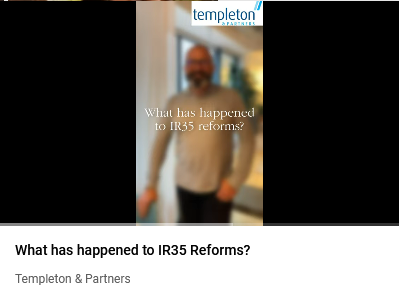Update as of October 2022 - The proposed repeal of existing IR35 legislation from April 6th 2023, has been amended. The new Chancellor of the Exchequer, Jeremy Hunt, announced on Monday (October 17th) the reversal of a number of the Mini Budget proposals, including the repeal of the off-payroll working reforms.

Templeton's Announcement Regarding the Latest Changes
"The plan to reverse IR35 proposed reforms has been cancelled, so we're back where we were before," said Mike Beresford, Templeton's Group Commercial Director (GCD) and expert in the UK's contracting marketplace.
"Any changes were only going to take place if they were approved by the government and would take effect next April. Unfortunately, those changes are not now happening."
"We continue as we are, as we always have done since IR35 was amended."
"We, as your agent, are responsible for the determination of your status as a personal service company. We're here to provide you with any assistance, support or guidance on how best to operate during these times and with IR35 as it's currently structured."
"We will continue to monitor what is going on and see what comes next at these interesting times we're facing in the UK. Watch this space, and we'll keep you updated if there's any further news."
Watch the full announcement here.
Before the Scrapping of the Repeal Plans
The reforms to the off-payroll working rules will be repealed from 6 April 2023, announced the Government; however, IR35 scrapped off from the reforms, will very much be here. But is reverting to the original IR35 regulations a step towards the right direction or just an unforeseen U-turn with unpredictable consequences for independent contractors and businesses?
During his mini-Budget presentation last Friday (23 September), Chancellor Kwasi Kwarteng announced a wide-ranging series of tax cuts and amends aimed at contributing to the growth of the economy, including the repealing of the off-payroll working reforms.
Reforms to the IR35 legislation, labelled as "IR35 Reforms", were initially introduced in the public sector in 2017 before rolling out in the private sector in 2021. The changes to the legislation caused significant disruption to the UK's flexible labour market: The contractors saw the responsibility for determining their IR35 status passing over to their end client, and the liability also shifted from them to a fee-paying third party.
However, from April 2023, "workers across the UK providing their services via an intermediary, such as a personal service company, will once again be responsible for determining their employment status and paying the appropriate amount of tax and National Insurance contributions (NICs)", according to the Growth Plan 2022. From that date, striped from past reformations, the original IR35 will be very much awakened.
Although unexpected, the news of the repeal has been widely welcomed by the majority of the business world in hopes that this will restore the flexibility and agility of the UK's economy.
|
Responsibility for IR35 Status Determination Repeal of IR35 Reforms - The Employment Landscape Shifts from April 2023 Preparing for a Promising Yet Uncertain Future Potential Impact on Clients/Businesses Potential Impact on Contractors |
But how could does reverting to the original version of the IR35 legislation benefit contractors, businesses and HR teams, and how will it affect each party?
Let's break down this complex matter, starting from the basics.
What Is IR35?
Initially established in 2000, IR35 is a tax anti-avoidance legislation designed to combat "disguised employment" with defined rules determining whether a non-payroll worker is genuinely a contractor or a "disguised employee". The latter is essentially an employee, but rather than being on a payroll, they set up their own limited company or personal service company (PSC) to be taxed as a business – hence, to pay less tax.
HMRC introduced the off-payroll working rules (IR35) as an attempt to identify those personal services company contractors (who provide their services to clients through an intermediary such as a PSC but work and act as employees) and ensure that they pay broadly the same income tax and national insurance contributions as other employees.
IR35 Status: Inside or Out?
The terms "outside IR35" and "inside IR35" indicate an individual's employment status as being a genuine contractor (outside) or an employee for tax purposes (inside) and reflect whether they are operating within the legislation's scope or not.
Inside IR35
If a contractor is inside IR35, it means that the work they provide is similar to a service of employment rather than a service of self-employment. Therefore, HMRC considers them employees for tax purposes, and they are expected to pay the same tax and national insurance as an employee. Similarly, the client or the fee-payer (the third party that pays the contractor's personal service company) of that contractor must deduct employment status income tax and national insurance as if the contractor was an employee.
Outside IR35
This term refers to individuals operating legitimately as contractors and who therefore are not affected by the IR35 rules. Specifically, contractors with an outside IR35 employment status are taxed as a business through their personal services company rather than as employees, can pay themselves a salary in a tax-efficient way, and remain solely responsible for paying the right amount of national insurance contribution and tax.
Outside IR35 contractors operate independently from their clients and get to choose how, when and where they work. This could involve working on defined projects, actively marketing their business's services, and working for more than one client at a time. Moreover, an outside IR35 contract cannot include client-facing requirements, such as performance monitoring and appraisals, for it to be considered valid by HMRC.

IR35 Status Determination
Determining whether a contract falls inside or outside IR35 rules is a complex matter. In general, IR35 does not apply if the contract is for services rather than employment. However, to ensure IR35 compliance, HMRC uses the following factors:
- Supervision, Direction and Control: It relates to the degree of supervision, direction and control a client has over what, how, when and where a contractor completes their work.
- Substitution: It refers to whether a contractor has a genuine right of substitution.
- Mutuality of Obligation (MOO): It refers to whether a client is obliged to provide work, and whether a contractor is obliged to accept it.
Note: The above factors are being used to determine if IR35 applies to a contract since 2000, regardless of the original IR35 legislation's reforms or whether the contractor or the end-client operates within the public or private sector.
In particular, to be determined outside IR35, the following may apply:
- There is no obligation for the client to offer work and no obligation for the contractor to accept it (mutuality of obligation test).
- The contractor is not under the supervision or control of the client. Work schedules, methods, and locations are determined by the contractor.
- There is no limit to the contractor's right of substitution. No requirement exists for the contractor to provide their services personally.
- The contractor is paid on completion of tasks, projects, or milestones, and has no right to overtime or any other employee benefits.
Respectively, for an inside of IR35 determination, any of the following may apply:
- The client controls, directs and supervises the contractor’s work.
- Any change in the contractor (substitution) must be approved by the client in advance.
- It is the client's responsibility to pay fees for all hours or days worked.
- Contractors have no financial risk when performing services. In spite of any problems, they are paid every hour or day they work.
For clarification, HMRC has developed an online employment status tool (CEST) to help hirers, agencies and workers check whether a worker on a specific engagement should be classed as employed or self-employed for tax purposes.
Responsibility for IR35 Status Determination
Historically, the issue of determining whether a contractor should be deemed as being inside or outside IR35 – and therefore if they were required to be taxed as an individual or as a company, respectively – has been a matter of the contractor.
The off-payroll working rules were altered (IR35 reforms) in 2017 for the public sector and in 2021 for the private sector, shifting the responsibility for determining a worker's employment status from the contractors to the client organisation engaging them. Employers were now responsible for handling all tax and national insurance contributions (NIC) for their independent contractors, as well as liable if their tax status was deemed incorrect.
This is, however, now set to be reversed.
The Government has recently signalled its intention to repeal the off-payroll working reforms from April 2023, putting contractors once again in charge of their own tax liability.

Repeal of IR35 Reforms – The Employment Landscape Shifts from April 2023
From this date, workers providing their services via an intermediary (e.g. limited companies) are to regain sole responsibility for determining their employment status and paying the appropriate amount of tax and national insurance contributions under the IR35 rules. For businesses engaging contractors (end-clients), this means that they will no longer be responsible for employment status assessments nor exposed to PAYE or NICs if such assessments are incorrect.
"This will free up time and money for businesses that engage contractors that could be put towards other priorities. The reform also minimises the risk that genuinely self-employed workers are impacted by the underlying off-payroll rules", explains Mr Kwarteng in his Growth Plan.
Therefore, these changes are likely to be welcomed by both businesses and contractors, who feel that their status as independent third parties should be rewarded with favourable tax treatment. The repeal is well perceived also by HR teams, who had their own frustrations with the reforms in recent years, trusting that it will relieve them from some of the associated bureaucracy when working with contractors.
However, it is important for all parties (in particular contractors) to fully understand that the repeal of the past reforms does not abolish the IR35 rules, it rather puts them back in place from 2000. This means that the challenge of determining an independent worker's employment status as inside or outside IR35 remains – it's the responsibility and the liability that shifts.
Hence, companies engaging contractors should not see this increased freedom as a free pass to promote the use of PSCs to save on employer NICs: If an employment status is wrongly determined, companies are equally exposed to the risk of penalties with their contractors, as other legislation and HMRC powers may apply. In practical terms, both companies and contractors should review indemnity clauses in contracts to ensure they are well protected if a challenge to employment status occurs.
Preparing for a Promising Yet Uncertain Future
Whilst the initial reaction to the announcement of the changes in the off-payroll rules has been primarily positive, much uncertainty remains regarding what might come next.
At this point, making ambiguous projections might not be the best course of action. Instead, reflecting on the facts and concerns raised regarding the repeal of the IR35 reforms can help both contractors and businesses develop an effective and feasible transition plan.
- The repeal of the IR35 reforms is not yet in the statute. The announced reversal of the off-payroll working rules from April 2023 remains currently just a published intent. Nothing has been repealed yet, and nothing will be repealed until the next Finance Act.
- Until then, off-payroll rules are still a binding law. The current rules will apply for services provided before 6 April 2023, even when the payment is made on or after 6 April 2023. However, it is unclear how HMRC will deal with businesses inadvertently violating the rules in the interim period.
- The repeal does not mean the end of the IR35 rules. After April 2023, the original IR35 will be restored, meaning that contractors will once again be responsible for their status determination and tax compliance. However, businesses will remain exposed to tax risks if they pay contractors off-payroll when they know that the contractors should be taxed as employees.
- Determining IR35 status will remain challenging – it just becomes the contractor's responsibility. The announced repeal does not suggest any simplification of the status assessment procedures.
- Although the government says the change will free up resources for businesses that engage contractors, some might question the significant time and cost spent implementing the last reforms, which were the main reason many companies put blanket bans on PSCs in the first place.
.jpg?width=7360&name=scott-graham-5fNmWej4tAA-unsplash(1).jpg)
Potential Impact on Clients/Businesses:
After the 2021 IR35 reform, larger businesses with high volumes of contract workers faced a huge operational challenge to assess every role and the potential of significant risk if errors were made during the assessment process. As a result, a number of larger companies changed their policy regarding using PSC (Personal Service Company or Limited Company) workers by implementing a blanket ban on them. This avoided the need to carry out a worker status determination assessment on every role, thus ensuring there was no risk to the client. However, this situation is now about to change, and all clients need to review their policies. Here’s why:
- Candidate Choice: If a candidate for a new project is legitimately operating outside of IR35, then they will understandably want to operate via their PSC in future – this will be particularly common in the high-end digital transformation space where skills are rare or in high demand.
- New Candidates: The reduced bureaucracy will no doubt encourage more specialist workers to take the leap into the contracting world – if contractors are once again able to manage their own tax affairs, this will be a huge boost to the UK contracting workforce.
- Speed to Hire: Reducing the choice available will mean it will take longer to find suitable consultants for an assignment – ensuring a client is easy to do business with will make the organisation more attractive – enabling candidates to be found more quickly.
- Reduced Risk: The risk is now greatly reduced for clients who do legitimately use contractors outside IR35 but banned PSC workers. This significantly increases the talent pool available. Roles can still be assessed and tested to increase the confidence of the worker – particularly where a client needs an expert to provide skills and knowledge that do not exist in a client – e.g. a Business or Systems Analyst with commercial exposure from outside the client’s current environment.
- Reduced Cost: Many clients have been forced to outsource assignments to consultancy firms where in reality expert contractors could have provided this capability at significantly less cost, but due to the no PSC rules the option was not available.
Potential Impact on Contractors:
- Current Role Options: Many clients who banned PSCs adjusted pay rates to workers to support the increased operational cost these workers now faced. These workers currently enjoy higher rates and the security of confidence that they are operating 100% within the guidelines. These workers may choose to remain as is – particularly if they have worked on a project for some time and can see the potential to continue in a stable project for a long time ahead – rather than run the risk of jumping ship to a higher-paid project role which may not provide the same tenure.
- Changing Status: Clearly, if a contractor is absolutely convinced that their role is outside IR35 – but the client has previously had a ban on PSC use – there is an opportunity to review the position. This requires the client to change policy.
- Caution Is Advised: If a contractor has been operating in a client with a no PSC rule then, assuming that they are now free to shift, this is not something to do without careful consideration. Seek advice from experts either in your agency or with one of the many insurance providers to see if they assess the role as outside IR35 – to provide greater confidence and potentially protect the engagement.
- Next Assignment: There will be far more choices available to workers in the new tax year. This should make contracting in the UK an attractive option for new entrants into the contracting world.
Templeton’s Approach to Supporting You
Mike Beresford, the Group Commercial Director (GCD) at Templeton and Partners, shares his thoughts on the recent announcements relating to IR35 and the changes being repealed, and explains the actions our company will take to support our contractors and clients during this period of uncertainty.
For now, we carry on as normal
“The key points (of the repeal) are that the responsibility for proving that an IT contractor is operating outside of the IR35 defined criteria will move from the client or the agency of the worker. So, in essence, this is reverting to the model that we experienced previously. Obviously, the outcome of that is that any liability for any fines or tax penalties will move away from the client or the agency to the individual or limited company supplying that individual under a personal service company model.”
“But this (the repeal of the IR35 reforms) does not take effect until April 2023 and only if it's approved by parliament. So, in reality, nothing has currently changed. However, it's important that we all keep ourselves up to date and are sure that we have all the facts to hand.”
Preparing the ground
“To better support you, we have to think about the contractual relationship between our workforce and our customers. And that relationship is really important because it has to be a strength chain right the way through all contractual documents.”
“So we first approached our clients to understand their expected plans and any changes they may be thinking about in relation to how they engage candidates and contractors incumbent within their businesses. Currently, this is because different clients have different approaches to how they recognise contract workers. These clients generally fall into two camps. Firstly, those that test all roles to assess whether they are defined as inside or outside IR35. The second portfolio of clients took a decision when the rules were changed to move to a no PSC rule, which meant that they would not engage any contractor who was working via a Personal Service or Limited Company.”
“So we need to look at each of those client portfolios and discuss with them whether they are going to change or amend their processes to ensure that they remain competitive in attracting talent in the future. Once we're clear on our client's plans, we will then update you and discuss any options which may become available, both for new roles, but also for any extensions you may be approaching or new projects within your existing customer.”
“We're also speaking with a portfolio of umbrella companies. At Templeton, we use a portfolio of umbrella companies who are our partners to give you the very best service you can expect when you're working under this model. We assess these suppliers to ensure they meet specific criteria that we expect from all of our vendors, and therefore we approach them whenever there are any changes that we need their views on or that we need to share our opinion on. So we're currently discussing with them their approach to the changes and what actions they are taking now to ensure that they're providing our contractor workers with the best possible service in the future.”
Next steps
“Over the coming months, we'll keep you informed with any further changes or any further news as it becomes available to us. In addition, we're collecting the questions of our contracting community and our clients to produce an FAQ which will help you understand the changes without having to take much time out of your day.”
Having supplied IT contractors in the UK and further afield for over 26 years, Mike has experienced first-hand the evolution of contracting in the UK and supported hundreds, if not thousands of workers in navigating the changes the industry has faced.
If you have any questions or need further guidance on the IR35 rules, don't hesitate to contact us.

FAQ’s
-
I want to change my model from Umbrella to my PSC.
- We will need to check if this is possible with our client – we have to ensure that the contract “chain” is consistent and some clients have stated that we cannot engage workers via PSCs.
- If the option exists, we explore alternative options such as:
- Amending your existing agreement at the end of March and issuing new paperwork outlining the new engagement model.
-
My role is currently tested inside IR35. What can I do?
- You will remain on your current model for that role as the HMRC is likely to review your situation closely.
- Under the guidelines, if you are able to present a counterargument, then you may have the option to reverse the status – via a review of your working practices.
-
As my engagement has evolved, so has the role – will this allow me to be “Outside IR35” in future?
- Firstly, it is important to understand “what” has changed and get those points in writing in the next extension contract. Specifically, think about:
- Why has the project or working practices changed?
- Are you now directly in control of your working practices – what do you do?
- Does anyone in the client provide any instruction day to day?
- Are you able to choose when and where you work – how you work?
- Do you carry a financial risk in your contract if there is a problem with your services or work?
- Do you use your own equipment?
- Do you have other concurrent clients that you are working for?
- Do you have the right to substitute yourself with a suitably skilled alternative worker?
- Firstly, it is important to understand “what” has changed and get those points in writing in the next extension contract. Specifically, think about:
Templeton has over 26 years of experience recruiting highly skilled and diverse IT contractors across the world – find out more about our award-winning tech recruitment services.






